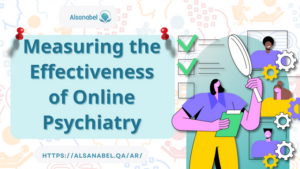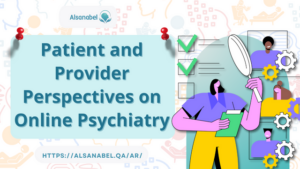Evaluating the Effectiveness of Online Psychiatry Treatment 2024
- Category online psychiatrist
Are you considering online psychiatry treatment as an option for mental health support? With the rise of telemedicine, evaluating the effectiveness of online psychiatrist care becomes crucial. Drawing from factual data and insights from mental health professionals, we delve into the themes of evaluation, comparison with in-person therapy, factors influencing effectiveness, and suggestions for the future use of online counseling. Join us as we explore the landscape of online psychiatry treatment to better understand its benefits and implications for mental well-being.
Measuring the Effectiveness of Online Psychiatry
Measuring the effectiveness of online psychiatry involves assessing various factors:

- Patient Outcomes: Evaluate changes in symptoms, functioning, and overall well-being before and after treatment using standardized assessments, self-report measures, and clinician observations.
- Treatment Adherence: Monitor patient engagement and session attendance to gauge commitment to treatment, with higher adherence rates indicating better outcomes.
- Therapeutic Alliance: Assess the quality of the therapeutic relationship between patient and therapist through surveys and ratings from both parties, as it strongly influences treatment effectiveness.
- Patient Satisfaction: Gather feedback on platform usability, therapist communication, and perceived benefit of treatment to assess overall satisfaction with the online therapy experience.
- Retention Rates: Measure the percentage of patients who continue treatment over time, with higher retention rates indicating greater effectiveness and satisfaction.
- Cost-Effectiveness: Analyze treatment outcomes achieved per dollar spent and potential savings in healthcare resources to determine the cost-effectiveness of online psychiatry compared to traditional therapy.
- Long-Term Follow-Up: Conduct follow-up assessments to evaluate maintenance of treatment gains and identify any relapse or recurrence of symptoms for assessing long-term effectiveness.
- Provider Feedback: Gather input from therapists on challenges, successes, and suggestions for improvement in delivering online therapy to inform strategies for enhancing effectiveness.
Systematically evaluating these factors provides a comprehensive understanding of online psychiatry service effectiveness and identifies areas for improvement to optimize patient outcomes.
Comparative Studies: Online vs. In-Person Psychiatry
Comparative studies between online psychiatry and in-person psychiatry reveal that both modalities have unique strengths and limitations:
- Effectiveness: Online psychiatry can be as effective as in-person treatment for various mental health conditions, with comparable outcomes in symptom reduction and treatment satisfaction.
- Accessibility and Convenience: Online psychiatry offers greater accessibility and convenience, eliminating travel barriers and allowing patients to access care from home.
- Therapeutic Alliance: In-person sessions may foster stronger rapport and trust between patients and providers due to face-to-face interactions.
- Patient Preference: Preferences vary, with some patients favoring online psychiatry for its convenience, while others prefer in-person sessions for the personal connection.
- Clinical Assessment: In-person psychiatry allows for more comprehensive clinical assessments, but telepsychiatry technology is narrowing this gap by improving visual clarity during online sessions.
- Crisis Management: In-person psychiatry offers immediate access to support in emergencies, but telepsychiatry platforms have protocols for managing crises and facilitating timely referrals.
- Cost-effectiveness: Online psychiatry may offer cost savings by reducing overhead expenses, but insurance coverage and reimbursement rates vary.
Ultimately, the choice between online and in-person psychiatry should consider individual patient preferences, clinical needs, and access to resources to provide high-quality, patient-centered mental health care.
Challenges and Limitations of Online Psychiatry
Online psychiatry treatment has numerous benefits but also faces challenges and limitations:
- Privacy and Security Concerns: Patient confidentiality and data security are critical due to the vulnerability of sensitive information to hacking or unauthorized access.
- Technology Limitations: Access to stable internet connection and suitable devices is essential, but issues like poor connectivity or device malfunctions can disrupt sessions.
- Assessment and Diagnosis Challenges: Remote psychiatric assessments may lack the observation of non-verbal cues, hindering accurate diagnoses.
- Therapeutic Alliance: Building rapport is crucial, but online sessions may lack the intimacy of face-to-face interactions, impacting the therapeutic relationship.
- Legal and Regulatory Issues: Compliance with telemedicine and mental health regulations, including licensing and prescribing, varies and poses challenges.
- Emergency Situations: Managing crises remotely can be complex, potentially delaying necessary care and support.
- Digital Disparities: Socioeconomic factors create disparities in access to online psychiatry, particularly for vulnerable populations with limited resources.
- Cultural and Linguistic Considerations: Cultural sensitivity and accommodating diverse backgrounds are essential, but language barriers and communication differences may affect effectiveness.
Addressing these challenges requires ongoing efforts to enhance technology, ensure compliance, protect privacy, and promote equitable access, necessitating collaboration between stakeholders.
Technological Tools and Platforms in Online Psychiatry
In online psychiatry, various technological tools and platforms are employed to facilitate therapy sessions and improve treatment experiences. These include:
- Video Conferencing Software: Enables real-time audio and video communication between patients and therapists, allowing face-to-face interaction despite distance.
- Secure Messaging Apps: Ensure confidential text-based communication between patients and therapists for ongoing support between sessions.
- Virtual Whiteboards: Tools for therapists to visually illustrate concepts during sessions, enhancing engagement and collaboration.
- Telepsychiatry Platforms: Comprehensive solutions tailored for mental health professionals, offering features like scheduling, billing, and EHR integration.
- Mobile Apps: Provide on-the-go access to therapy sessions, self-help resources, and mood tracking tools, offering flexibility and convenience.
- Virtual Reality (VR) Therapy: Simulates immersive therapeutic environments for conditions like anxiety or PTSD, offering exposure therapy or relaxation exercises.
- Online Assessment Tools: Web-based tools for screening, diagnosis, and treatment planning, enhancing efficiency and accuracy.
- Remote Monitoring Devices: Wearables and apps for remote tracking of physiological and behavioral data, providing insights into patients’ progress.
These tools enable online psychiatry practitioners to deliver accessible, personalized mental health care to individuals worldwide.
Patient and Provider Perspectives on Online Psychiatry
Patient and provider perspectives on online psychiatry service highlight several key points:

- Convenience and Accessibility: Patients appreciate the convenience and accessibility of online psychiatry, while providers see it as a way to reach underserved populations.
- Flexibility of Scheduling: Online psychiatry offers flexible scheduling, accommodating busy lifestyles for patients and allowing providers to adjust schedules.
- Comfort and Privacy: Patients feel more comfortable discussing sensitive issues at home during online sessions, while providers prioritize creating a safe and confidential environment.
- Technological Challenges: Both patients and providers acknowledge potential technical issues, such as internet connectivity problems and navigating digital platforms.
- Therapeutic Relationship: Building a strong therapeutic relationship is crucial in online psychiatry, with patients valuing empathy and responsiveness from providers.
- Clinical Effectiveness: While some report positive outcomes, concerns about limitations in virtual sessions, such as assessing non-verbal cues, exist.
- Cultural and Linguistic Competence: Providers recognize the importance of cultural sensitivity and language accessibility, while patients appreciate sensitivity to their cultural backgrounds and language preferences.
Overall, patient and provider perspectives on online psychiatry underscore the potential benefits of telepsychiatry in improving access to care, enhancing flexibility, and addressing patient needs, while also highlighting the importance of addressing technological challenges, maintaining therapeutic rapport, and ensuring cultural competence in virtual mental health services.









